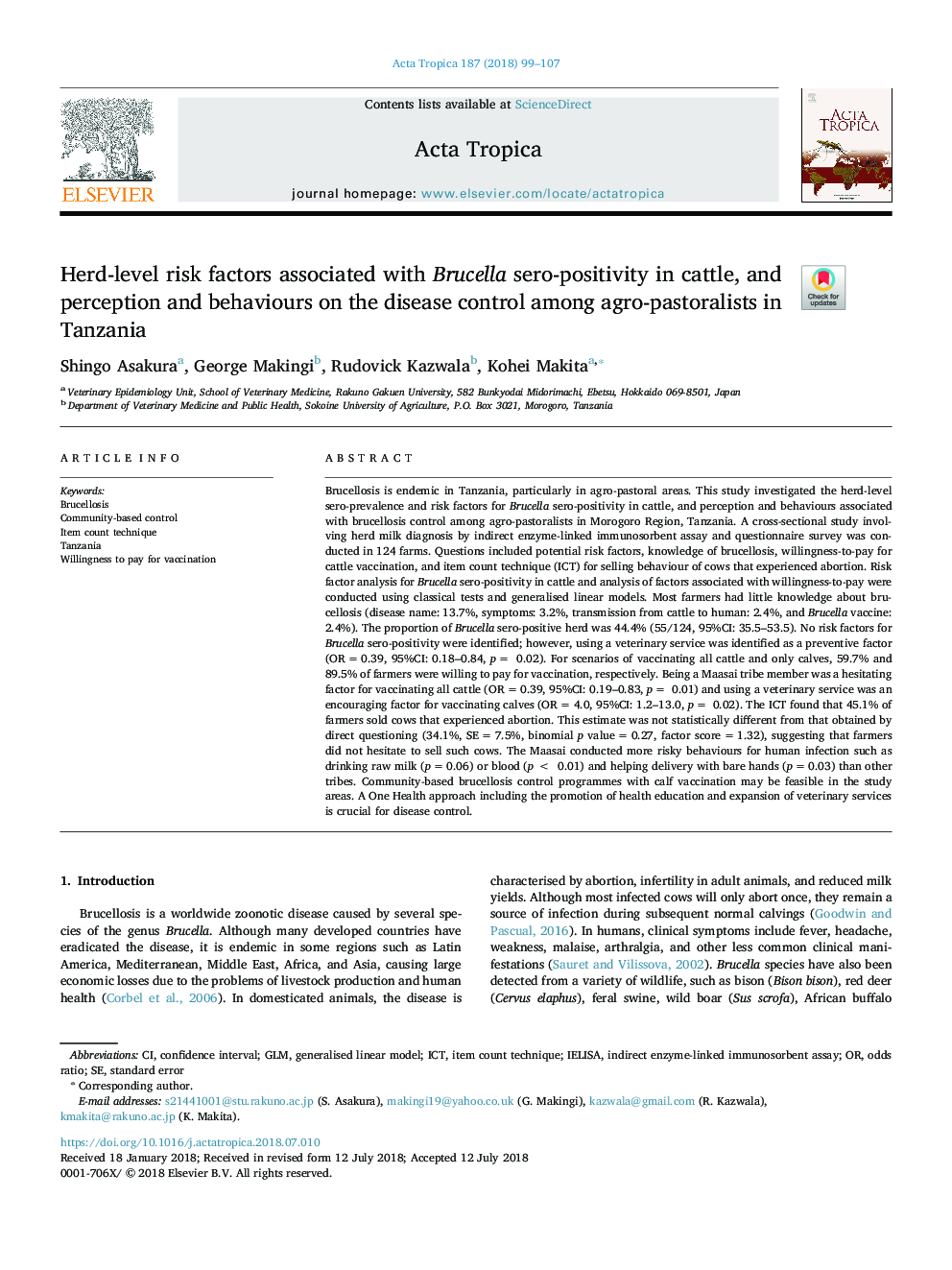| کد مقاله | کد نشریه | سال انتشار | مقاله انگلیسی | نسخه تمام متن |
|---|---|---|---|---|
| 8744091 | 1592737 | 2018 | 9 صفحه PDF | دانلود رایگان |
عنوان انگلیسی مقاله ISI
Herd-level risk factors associated with Brucella sero-positivity in cattle, and perception and behaviours on the disease control among agro-pastoralists in Tanzania
ترجمه فارسی عنوان
عوامل خطر ابتلا به گله در ارتباط با حساسیت مثبت بروسلا در گاو و درک و رفتار در کنترل بیماری در میان کشاورزان در تانزانیا
دانلود مقاله + سفارش ترجمه
دانلود مقاله ISI انگلیسی
رایگان برای ایرانیان
کلمات کلیدی
GLMiELISA - IELISATanzania - تانزانیاBrucellosis - تب مالتIndirect enzyme-linked immunosorbent assay - تست ایمونوسیورسنت وابسته به آنزیم غیر مستقیمstandard error - خطای استانداردconfidence interval - فاصله اطمینانICT - فناوری اطلاعات و ارتباطات Generalised Linear Model - مدل خطی کلیodds ratio - نسبت شانس ها
موضوعات مرتبط
علوم زیستی و بیوفناوری
ایمنی شناسی و میکروب شناسی
انگل شناسی
چکیده انگلیسی
Brucellosis is endemic in Tanzania, particularly in agro-pastoral areas. This study investigated the herd-level sero-prevalence and risk factors for Brucella sero-positivity in cattle, and perception and behaviours associated with brucellosis control among agro-pastoralists in Morogoro Region, Tanzania. A cross-sectional study involving herd milk diagnosis by indirect enzyme-linked immunosorbent assay and questionnaire survey was conducted in 124 farms. Questions included potential risk factors, knowledge of brucellosis, willingness-to-pay for cattle vaccination, and item count technique (ICT) for selling behaviour of cows that experienced abortion. Risk factor analysis for Brucella sero-positivity in cattle and analysis of factors associated with willingness-to-pay were conducted using classical tests and generalised linear models. Most farmers had little knowledge about brucellosis (disease name: 13.7%, symptoms: 3.2%, transmission from cattle to human: 2.4%, and Brucella vaccine: 2.4%). The proportion of Brucella sero-positive herd was 44.4% (55/124, 95%CI: 35.5-53.5). No risk factors for Brucella sero-positivity were identified; however, using a veterinary service was identified as a preventive factor (ORâ¯=â¯0.39, 95%CI: 0.18-0.84, pâ¯=⯠0.02). For scenarios of vaccinating all cattle and only calves, 59.7% and 89.5% of farmers were willing to pay for vaccination, respectively. Being a Maasai tribe member was a hesitating factor for vaccinating all cattle (ORâ¯=â¯0.39, 95%CI: 0.19-0.83, pâ¯=⯠0.01) and using a veterinary service was an encouraging factor for vaccinating calves (ORâ¯=â¯4.0, 95%CI: 1.2-13.0, pâ¯=⯠0.02). The ICT found that 45.1% of farmers sold cows that experienced abortion. This estimate was not statistically different from that obtained by direct questioning (34.1%, SEâ¯=â¯7.5%, binomial p valueâ¯=â¯0.27, factor scoreâ¯=â¯1.32), suggesting that farmers did not hesitate to sell such cows. The Maasai conducted more risky behaviours for human infection such as drinking raw milk (pâ¯=â¯0.06) or blood (pâ¯<⯠0.01) and helping delivery with bare hands (pâ¯=â¯0.03) than other tribes. Community-based brucellosis control programmes with calf vaccination may be feasible in the study areas. A One Health approach including the promotion of health education and expansion of veterinary services is crucial for disease control.
ناشر
Database: Elsevier - ScienceDirect (ساینس دایرکت)
Journal: Acta Tropica - Volume 187, November 2018, Pages 99-107
Journal: Acta Tropica - Volume 187, November 2018, Pages 99-107
نویسندگان
Shingo Asakura, George Makingi, Rudovick Kazwala, Kohei Makita,
